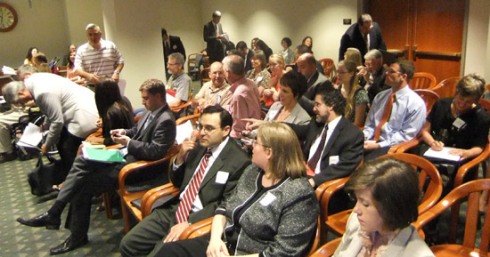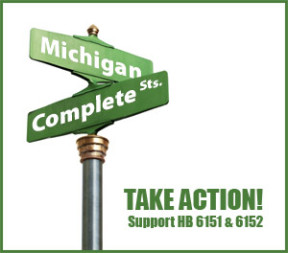You are currently browsing the monthly archive for May 2010.

With standing room only, the room was abuzz with Complete Streets supporters on May 27th as the House Transportation Committee took testimony on HB 6151 and 6152.
It was standing room only yesterday as the House Transportation Committee took testimony on HB 6151 and 6152, Complete Streets legislation introduced by Representatives Jon Switalski and Pam Byrnes. The legislation would ensure that future road projects throughout Michigan would be required to provide safe accommodations for all roadway users such as bicyclists, pedestrians and those with disabilities.
The Coalition sincerely thanks everyone who came to the hearing and submitted testimony and cards of support. The committee members were impressed with the turnout and the amount of written testimony they received.
Providing moving testimony was Michelle Miles, mother of Jasmine Starr Miles, who was fatally struck by two cars and tragically killed in 2003 within 1,000 feet of a school zone while crossing a four lane road in Lansing. The roadway had neither crosswalks nor a sidewalk available. Cynthia Redinger of Opus International Consultants, Inc then presented a Powerpoint overview on what Complete Streets look like.
Opposition (MDOT, CRAM, MAC and MTA) is working hard to defeat these bills - as we knew they would. Their approach is that they support the concept of Complete Streets, but view these bills as an unfunded mandate. Testimony from numerous supporters of the bills, however, debunked such claims, including AARP’s Adam Goldberg and Ypsilanti Mayor Paul Schreiber who cited multiple examples of additional cost and delays in road projects in his community because of inadequate planning to accommodate nonmotorized users.
Representative Switalski’s testimony also cited recent examples in Mt. Pleasant, Kalamazoo and Traverse City where MDOT has failed to coordinate with local road agencies:
“The other component of this legislation is the coordination of the department and local road agencies on transportation projects. MDOT does great work for our state but we are asking them to do a little more when it comes to coordinating with locals on state trunklines in cities. On several occasions the department has not coordinated with local road agencies on state trunkline projects in that local road agencies’ jurisdiction.”
 Registration is now closed for the League of Michigan Bicyclists, Michigan Mountain Biking Association and Michigan Trails and Greenways Alliance 2010 Lucinda Means Advocacy Day on May 26. 85 bicyclists from across the state will be meeting in person with their representatives to voice their support for Complete Streets legislation, Michigan House Bills 6151 and 6152. If you’re unable to attend the event, you can still help out fellow bicyclists by participating in our virtual lobbying day.
Registration is now closed for the League of Michigan Bicyclists, Michigan Mountain Biking Association and Michigan Trails and Greenways Alliance 2010 Lucinda Means Advocacy Day on May 26. 85 bicyclists from across the state will be meeting in person with their representatives to voice their support for Complete Streets legislation, Michigan House Bills 6151 and 6152. If you’re unable to attend the event, you can still help out fellow bicyclists by participating in our virtual lobbying day.
GUIDE TO VIRTUAL LOBBYING:
Step 1
Sign our predrafted email to House Transportation Committee Members expressing your support for HB 6151 and 6152. Please put your first and last name in the “Name” field. You are also encouraged to personalize the message using the “Personal Statement” field. The email form can be found at http://citizenspeak.org/node/2032 (this link has been disabled).
Step 2
Call your representative – the combination of face-to-face and phone communications in support of the bills will demonstrate a strong and unified Michigan voice. By putting in your 10-digit zip code at www.votesmart.org, you can determine who your legislators are and find their phone numbers.
We encourage you to use the talking points below to send your own alert encouraging your members to participate.
TALKING POINTS:
- Complete Streets ensure that our roads are safe, more livable, and accessible to people of all ages and abilities.
- Complete Streets boosts the economy by increasing residential property values and facilitating retail and commercial development.
- Complete Streets improve safety and reduce crashes by providing pedestrian and bicycling infrastructure, such as safe crossings, sidewalks or on-road bicycle lanes.
- Complete Streets promote public health by making it safe and convenient for children and families to incorporate physical activity into their daily lives.
KEY FACTS:
- The 2001 National Household Transportation Survey reported that 50 percent of all trips in metropolitan areas are 3 miles or less, and 28 percent are 1 mile or less.
- Complete Streets policies have been adopted in 21 states, including Illinois, Minnesota and Wisconsin.
- A study in Houston found that 3 out of 5 disabled and elderly citizens do not have sidewalks between their home and the nearest bus stop.
For more specific information, please download our Complete Streets fact sheet. The National Complete Streets Coalition site also has great fact sheets by issue area if you need additional resources.
The Michigan Complete Streets Coalition needs your help to support Complete Streets legislation. The legislation requires communities and road agencies to consider nonmotorized and public transit accommodations to our transportation corridors in state, regional and local planning and implementation processes as a way to create more walkable, bikeable places where children and families can be physically active.
We are asking organizations and their individual members and/or associates to take action. Show support for this effort by sending your legislators a letter urging them to adopt Michigan House Bills 6151 and 6152. A template letter of support can be found below.
Organization leaders are also asked to forward these materials to their members and/or associates encouraging them to take action.
TAKE ACTION TODAY:
Step 1
Sign our predrafted email to House Transportation Committee Members expressing your support for HB 6151 and 6152. Please put your first and last name in the “Name” field. You are also encouraged to personalize the message using the “Personal Statement” field. The email form can be found at http://citizenspeak.org/node/2032
Step 2
Using the sample provided on the following page, we also ask that you write a personalized letter to your individual Representative and Senator.
By putting in your 10-digit zip code at www.votesmart.org, you can determine who your legislators are and find their email addresses. Letters can be sent electronically or mailed to representatives and senators at the following addresses:
State Representatives
P.O. Box 30014
Lansing, MI 48909 - 7514
State Senators
P.O. Box 30036
Lansing, MI 48909 - 7536
Step 3
Please mark your calendars for May 27th at 10:30am. The House Transportation Committee will be taking testimony on the these bills. We would like to fill the room, so please consider attending these hearings. You may submit verbal or written testimony and/or simply fill out a comment card expressing your support for the legislation.
If you are planning to testify, we’d recommend being strategic and picking one or two angles you’d like to take (e.g. childhood obesity, overall health impacts, aging population, cost savings, environmental benefit, etc), as we are expecting a high level of interest and testimony needs to be short and sweet. If you are interested in submitting testimony, we also ask if that you please contact John Lindenmayer asap so we can attempt to coordinate everyone’s testimony.
Please download our Complete Streets fact sheet to learn more. The National Complete Streets Coalition site also has great fact sheets by issue area if you need additional resources to begin preparing your testimony.
SAMPLE LETTER (please personalize)
(Download Word Version of this Sample Letter)
<Date>, 2010
The Honorable <Name>
Post Office Box
Lansing, MI 48909
<Dear Representative/Senator>:
<I am/Organization is> asking that you support Michigan Complete Streets legislation. House Bills 6151 and 6152 were introduced to encourage communities and road agencies to consider nonmotorized and public transit accommodations to our transportation corridors in state, regional and local planning and implementation processes as a way to create more walkable, bikeable places where children and families can be physically active.
Complete streets policies ensure that infrastructure is designed and operated to enable safe access for all users. Pedestrians, bicyclists, motorists and transit riders of all ages and abilities can move safely along and across a complete street. There is no prescription for what a Complete Street looks like. A Complete Street in a rural area will look different from a Complete Street in a highly urban area, but both are designed to balance safety and convenience for everyone using the road.
Complete Streets boost the economy by increasing residential property values because homeowners are willing to pay more to live in walkable communities and businesses located along Complete Streets often see an increase in sales. Complete Streets improve safety and reduce crashes by providing pedestrian and bicycle infrastructure, such as safe crossings, sidewalks, or on-road bicycle lanes. Complete Streets promote public health by making it safe and convenient for children and families to incorporate physical activity into their daily lives as a way to combat the obesity epidemic.
Clearly, supporting Complete Streets is investing in a stronger and healthier Michigan. <I/We> urge you to vote in favor of the Michigan Compete Streets Bills. Together we can create a more vibrant Michigan.
Sincerely,
<Name>
<Title>
 The Michigan Complete Streets Coalition is excited to announce that a package of Complete Streets bills (HB 6151 & HB 6152) were introduced last night in the Michigan House. Both bills were referred to the Transportation Committee.
The Michigan Complete Streets Coalition is excited to announce that a package of Complete Streets bills (HB 6151 & HB 6152) were introduced last night in the Michigan House. Both bills were referred to the Transportation Committee.
HB 6151, states that “the Department [MDOT], local road agencies, and municipalities that receive appropriations under this act [Act 51] shall adopt complete streets policies” within two years.
The proposed legislation would require the “adequate accommodation, in all phases of project planning, development, construction, maintenance, and operation of all users of the transportation system, including, but not limited to, pedestrians, bicyclists, public transit users, children, older individuals, motorists and individuals with disabilities.”
The bill also creates a Complete Streets Advisory Council at the state level to “assist local road agencies and municipalities with implementation of Complete Streets Policies.”
The Coalition worked closely with bill sponsors Representative Jon Switalski and House Transportation Chair Pam Byrnes in crafting the bill language. The Coalition also helped to develop specific exceptions in line with the National Complete Streets Coalition’s recommendations that take into consideration exorbitant cost (20% of the total project cost) as well as “urban, suburban or rural context in which a project is located.”
Such exemptions would have to be approved by a primary transportation planning authority such as MDOT, a metropolitan planning organization, or the regional, county or city agency responsible for planning and approving the project.
The companion bill, HB 6152, would update Michigan’s Planning Enabling Act by adding non-motorized transportation, Complete Streets and traffic calming as required elements of a municipal master plan.
We encourage individuals and organizations to contact their State Representatives (see sample letter below) in support of both bills.
















